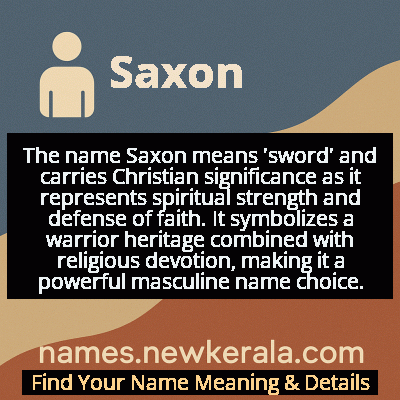Saxon Name Meaning & Details
Origin, Popularity, Numerology Analysis & Name Meaning of Saxon
Discover the origin, meaning, and cultural significance of the name SAXON. Delve into its historical roots and explore the lasting impact it has had on communities and traditions.
Name
Saxon
Gender
Male
Origin
Christian
Lucky Number
1
Meaning of the Name - Saxon
The name Saxon means 'sword' and carries Christian significance as it represents spiritual strength and defense of faith. It symbolizes a warrior heritage combined with religious devotion, making it a powerful masculine name choice.
Saxon - Complete Numerology Analysis
Your Numerology Number
Based on Pythagorean Numerology System
Ruling Planet
Sun
Positive Nature
Leaders, ambitious, highly driven, self-reliant, innovative.
Negative Traits
Overly aggressive, domineering, impatient, selfish.
Lucky Colours
Red, orange, gold.
Lucky Days
Sunday.
Lucky Stones
Ruby, garnet.
Harmony Numbers
2, 3, 9.
Best Suited Professions
Entrepreneurs, managers, engineers.
What People Like About You
Courage, determination, leadership.
Famous People Named Saxon
Saxon Priest
Musician
Lead vocalist of the British heavy metal band Saxon
Saxon Sharbino
Actress
Known for roles in 'Touch' and 'Martyrs', establishing herself in Hollywood
Saxon White
Athlete
Professional rugby player known for his powerful performances
Name Variations & International Equivalents
Click on blue names to explore their detailed meanings. Gray names with will be available soon.
Cultural & Historical Significance
The Saxon people's legacy extends beyond military conquest to include significant contributions to law, governance, and cultural development in early medieval Europe. Their name has come to symbolize endurance, cultural identity, and the complex process of cultural synthesis that characterized the early Middle Ages. In Christian tradition, the name also recalls the missionary efforts that converted the Saxon peoples, making it a testament to both earthly strength and spiritual transformation.
Extended Personality Analysis
Individuals named Saxon often exhibit strong leadership qualities, determination, and a natural sense of authority. They tend to be practical problem-solvers who approach challenges with directness and courage, reflecting the warrior heritage embedded in their name. While they can be assertive and competitive, Saxons typically balance this strength with loyalty to their community and a protective nature toward those they care about. Their combination of resilience and reliability makes them natural pillars in both professional and personal relationships.
Beyond their evident strength, people named Saxon often possess a deep sense of tradition and history, valuing their roots and cultural heritage. They approach life with a strategic mindset, much like the historical Saxons who carefully planned their settlements and defenses. This thoughtful approach, combined with their natural confidence, allows them to navigate complex situations effectively. Their personality often blends the warrior's courage with the statesman's wisdom, making them respected figures in their various circles of influence.
Modern Usage & Popularity
In contemporary times, Saxon has experienced a revival as a strong, distinctive masculine name that appeals to parents seeking names with historical depth and powerful connotations. While not among the most popular names, it maintains steady usage particularly in English-speaking countries and among families with Germanic or British heritage. The name's appeal lies in its combination of historical significance, straightforward pronunciation, and the growing trend toward names that convey strength and tradition without being overly common. Recent years have seen increased interest in names with Anglo-Saxon roots, positioning Saxon as both classic and contemporary.
Symbolic & Spiritual Meanings
Symbolically, Saxon represents strength, resilience, and cultural heritage. The sword association signifies cutting through obstacles and defending principles, while the historical connection to the Saxon people embodies foundations, settlement, and the establishment of order. In Christian symbolism, the name can represent spiritual warfare and the defense of faith, drawing parallels between physical swords and the 'sword of the Spirit' mentioned in Ephesians. The name carries connotations of protection, justice, and the ability to forge new paths while honoring tradition, making it a powerful symbolic choice that bridges historical legacy with contemporary values.

